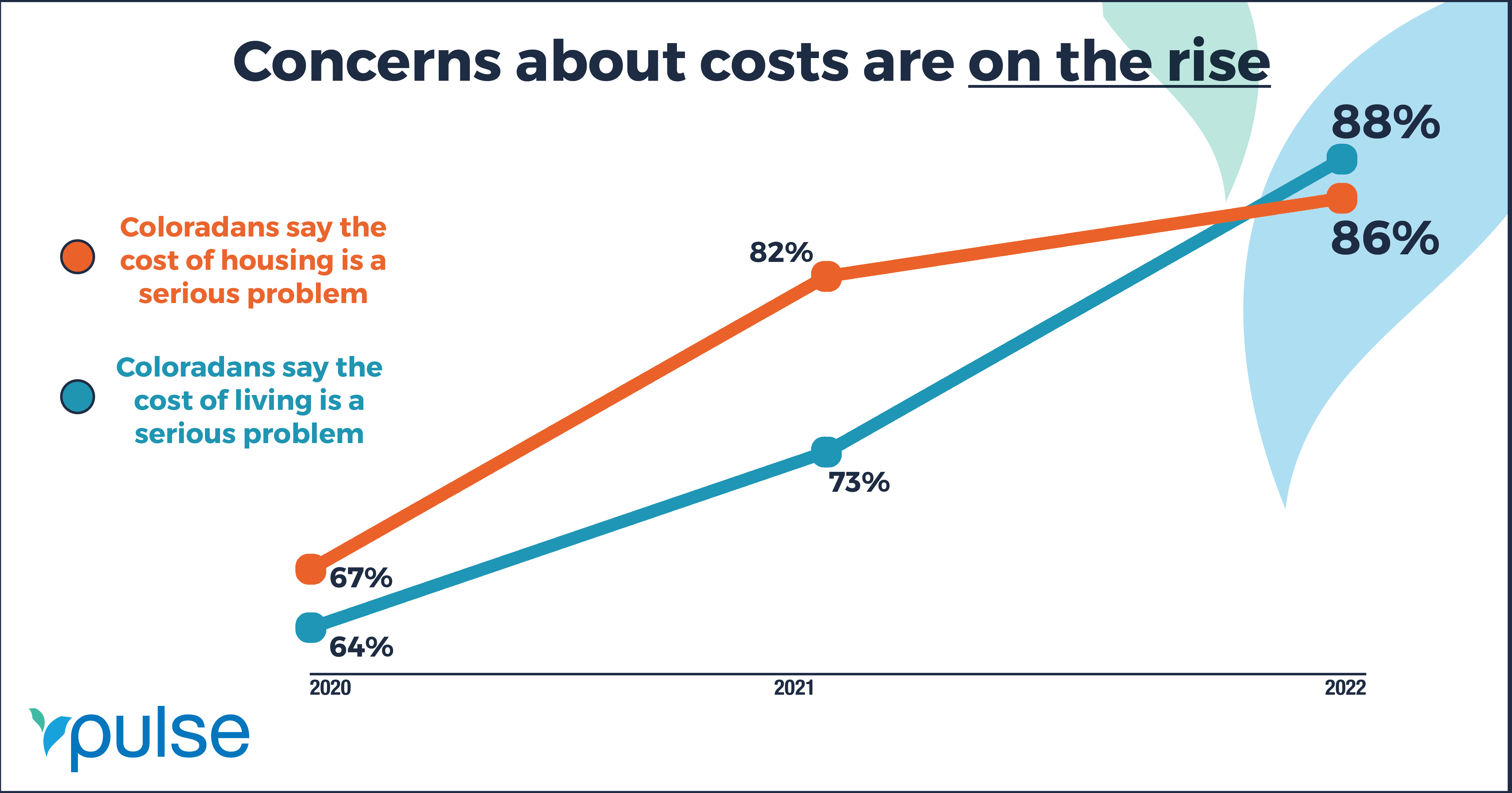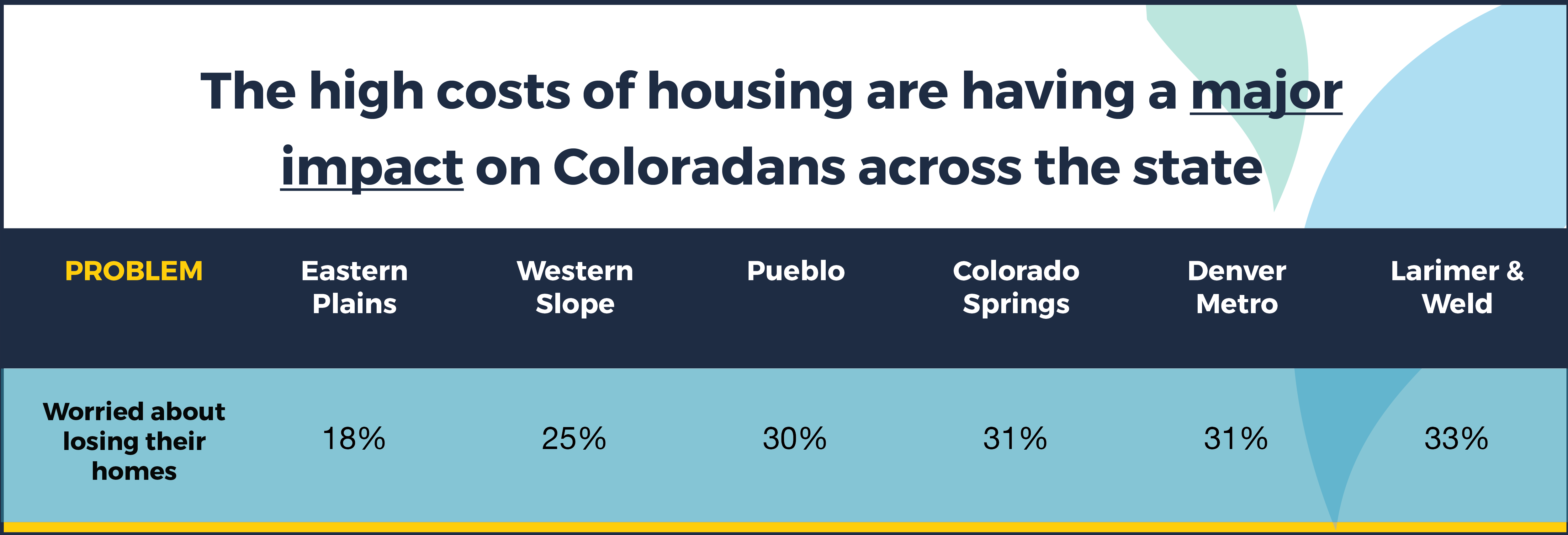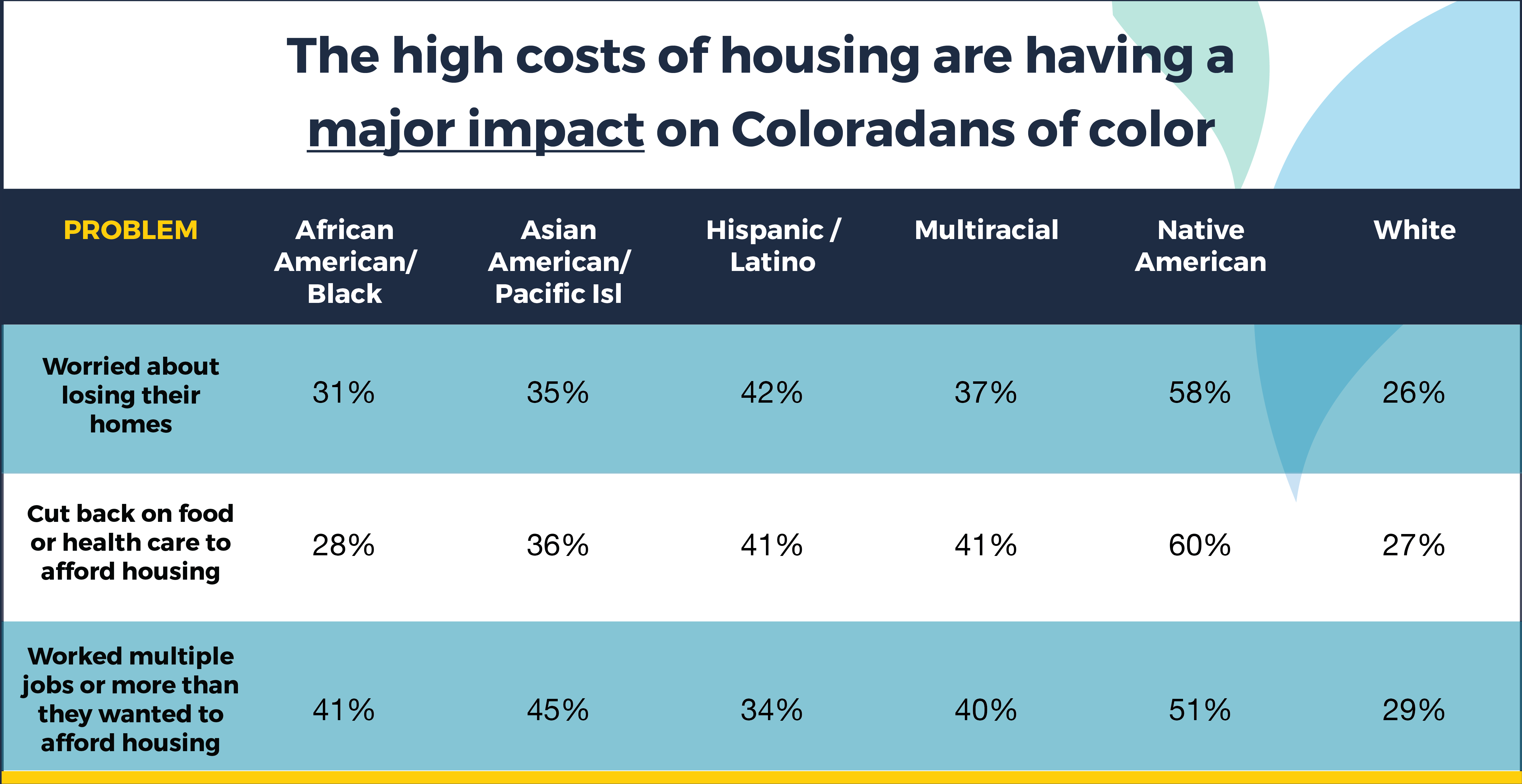Press Contacts:
For interview opportunities with members of The Colorado Health Foundation, the research team and/or representatives from partner organizations and Colorado residents directly impacted by the topics covered in the 2022 Pulse Poll, please contact:
Marty Schechter, marty@schechterpr.com, (303) 882-4585
Austin Montoya, amontoya@coloradohealth.org, 303-953-3686
DENVER, COLORADO – One year after Coloradans expressed confidence in a rebounding economy, they are now feeling overwhelmed by increased costs of living, especially but not limited to the cost of housing throughout the state, according to findings from Pulse: The Colorado Health Foundation Poll, an annual survey that explores the most pressing issues facing Coloradans. Those costs are forcing many to make difficult sacrifices when it comes to food and health care expenses.
Through Pulse, The Colorado Health Foundation holds up a mirror to the state and reflects back what’s found in the data: the worries, the experiences and the priorities of our neighbors. In 2022, the third year of conducting Pulse, The Colorado Health Foundation’s bipartisan team of researchers (FM3 Research, a Democratic firm, and New Bridge Strategy, a Republican firm) talked to 2,985 Coloradans during the month of April.
From those conversations, two issues are clearly keeping people up at night: the increasing cost of living and the lack of affordable housing. When given a list of problems to rank, respondents put “the rising cost of living” and “the cost of housing” top on the list (88% and 86% respectively), saying that the problems are extremely or very serious. When asked what expenses most concern them personally, Coloradans volunteered housing (50%), food (30%) and fuel/gas (30%).

“Taking the annual pulse of our state’s residents is an imperative step in identifying and understanding what they are thinking, feeling and experiencing,” said Karen McNeill-Miller, president and CEO of The Colorado Health Foundation. “This research shows us not only what is hitting us hardest but, most importantly, the people being hit the hardest as well. The results serve as the foundation of our advocacy for the health and well-being of all Coloradans and provide us with valuable information that can be used to create and implement meaningful solutions with our local and state officials, as well as business and community leaders.”
What is most striking about this year’s poll results is how rapidly Coloradans’ economic concerns and pain points increased since last year. Coloradans are feeling an economic squeeze across the board—from the cost of food and gas to rent and utilities.
The cost of living is creating significant economic uncertainty.
While all Coloradans are concerned about rising costs, many respondents are already struggling to make ends meet. Between August 2021 and April 2022, there has been a marked increase in the number of Coloradans worried about their overall financial well-being and their ability to afford necessities such as food for their families.
- More than 40% of Coloradans say that they are worse off financially than a year ago, a jump from 25% in 2021.
- Nearly 40% of Coloradans are worried that they might not always be able to afford enough food to feed themselves and their families, up from 23% in 2021.
- Nearly one in five (16%) Coloradans have skipped meals in the last year because they couldn’t afford food – almost doubling 2021’s numbers (9%).
“These are stark and dramatic increases in Coloradans reporting that they are worried about meeting the basic needs of their family. In just one year’s time, these worries have extended from mostly fears of lower-income Coloradans into the concerns of the middle class,” said Lori Weigel, Republican pollster for Pulse and Principal of New Bridge Strategy.
Some Coloradans are more likely to report experiencing food insecurity: Hispanic/Latino Coloradans, Native Americans, people living on low incomes (under $50,000 annually) and people with disabilities.

The rising cost of housing is forcing difficult tradeoffs for many.
The cost of housing is a top issue for Coloradans, causing significant worry among many that they’ll lose their homes.
- More than 8-in-10 (86%) Coloradans consider the cost of housing to be a serious problem in the state, and 30% are worried they might lose their homes in the next year because they can’t afford the monthly rent or mortgage – up from 21% in 2021.
- Renters are more likely to worry about housing than homeowners: 95% consider it a serious problem (compared to 82% of homeowners), and 52% are worried about losing their homes because they can’t afford to pay (compared to 20% of homeowners).
- Coloradans living in more urban and suburban regions along the Front Range are more likely to be worried about losing their homes compared to people living on the Eastern Plains or Western Slope.

For some Coloradans, the cost of housing is already requiring sacrifices that may be harming their health and well-being.
- Over 30% of all Coloradans have cut back on – or gone without – other needs like food or health care in order to afford housing.
- Over 30% have worked multiple jobs or more than they wanted to in order to pay the rent or mortgage.
- About one-third of renters have avoided asking their landlords to address problems for fear of rent increases or eviction.
- People living on low incomes are far more likely to have made difficult sacrifices: 50% have cut back on other needs, 43% have worked more than they wanted, and 40% have avoided asking their landlords to address problems.
The high costs of housing are having a major impact on the daily lives of Coloradans of color in particular.

Coloradans see policy changes as an effective way to address the cost of living.
Coloradans across the board expressed a desire for action to address the rising cost of living, and they see a role for taxpayers, employers and the government. A majority of respondents believe the following policies would be effective solutions in helping Coloradans make ends meet:
- Changing government regulations to reduce the cost of household expenses like food, health care and utilities (73%).
- Raising taxes on people making over $500,000/year to cover government services like housing, health care and education (60%).
- Requiring employers to increase pay and benefits for low- and middle-income workers (59%).
- Making government investments to stimulate the economy and create better-paying jobs in communities that are struggling (59%).
“Among Coloradans likely to vote in November, financial security will be front and center in their minds when they fill out their ballots,” said Dave Metz, Democratic pollster for Pulse and president of FM3 Research. “When asked to name the issues that will be most important to choosing candidates in November, likely voters point to the cost of living and economy more than any other consideration.”
Coloradans think landlords, developers and the government all have roles to play in lowering housing costs.
The number of Coloradans struggling to afford housing is growing, and likely voters cite affordable housing – or the lack of it – among the top three issues on their minds as they look ahead to the November 2022 election. Strong majorities of unaffiliated voters, Republicans and Democrats believe that adopting the following policies would be effective in making housing more affordable:
- Ensuring landlords cannot raise rents on current tenants too quickly (74%).
- Requiring developers to build housing for people with lower income levels (71%).
- Reducing government regulations to speed up the building of new housing (57%).

Register for Pulse briefings.
This year, the Colorado Health Foundation is releasing findings from its statewide poll in three phases, while providing a variety of options for the public and other audiences to engage with the data that interests them most. The initial phase covers results related to the cost of living and housing. The second phase in early June will share the perspectives of Coloradans on health care, mental health and alcohol and drug use. And, the final phase in mid-June will provide a deep-dive understanding of all the challenges that impact Coloradans most and the solutions they’d like to see prioritized.
There’s still time to register for our briefing on the cost of living and housing. REGISTER NOW for this event on Tuesday, May 24, 11 a.m. – 12 p.m.
Also, consider registering for these upcoming briefings:
- Pulse Briefing #2, Coloradans on Health and Well-being: Wednesday, June 8, 11 a.m. - 12 p.m.
- Pulse Briefing #3, Deep Dive on Critical Themes from the Survey: Wednesday, June 22, 10 - 11:30 a.m.
To register for a Spanish-only briefing, click here.
Each briefing will share detailed data about the challenges that Coloradans are facing, the impact of those challenges and the types of solutions that people want to see prioritized by policymakers.
The following resources are available for download.
The Colorado Health Foundation is committed to transparency, including access to the full results of Pulse. These resources are available in both English and Spanish and include:
- Questionnaire with topline results (English | Spanish)
- Cross-tabs with data on how different sub-groups answered each question (English | Spanish)
- Presentation deck with easy-to-read charts and graphs (English | Spanish coming soon)
About Pulse
At The Colorado Health Foundation, we believe in the importance of listening, and that’s why each year we listen to Coloradans from across the state through our annual poll. From the increasing cost of living and lack of affordable housing, to health care and mental well-being, our poll takes the pulse of Coloradans on a range of important issues this year and every year – to inform policy that advances health equity. For more information, visit www.copulsepoll.org.
The 2022 Pulse Poll was conducted by telephone and online from April 5-26, 2022 among a random representative sample of 2,985 adults age 18 and older living in Colorado. The margin of sampling error for the full sample is +/-2.2% at the 95% confidence interval. For results based on sub-groups, the margin of sampling error is higher.
About The Colorado Health Foundation
The Colorado Health Foundation is a nonprofit, nonpartisan organization bringing health in reach for all Coloradans by engaging closely with communities across the state through investing, policy advocacy and research. For more information, visit www.coloradohealth.org.
# # #
